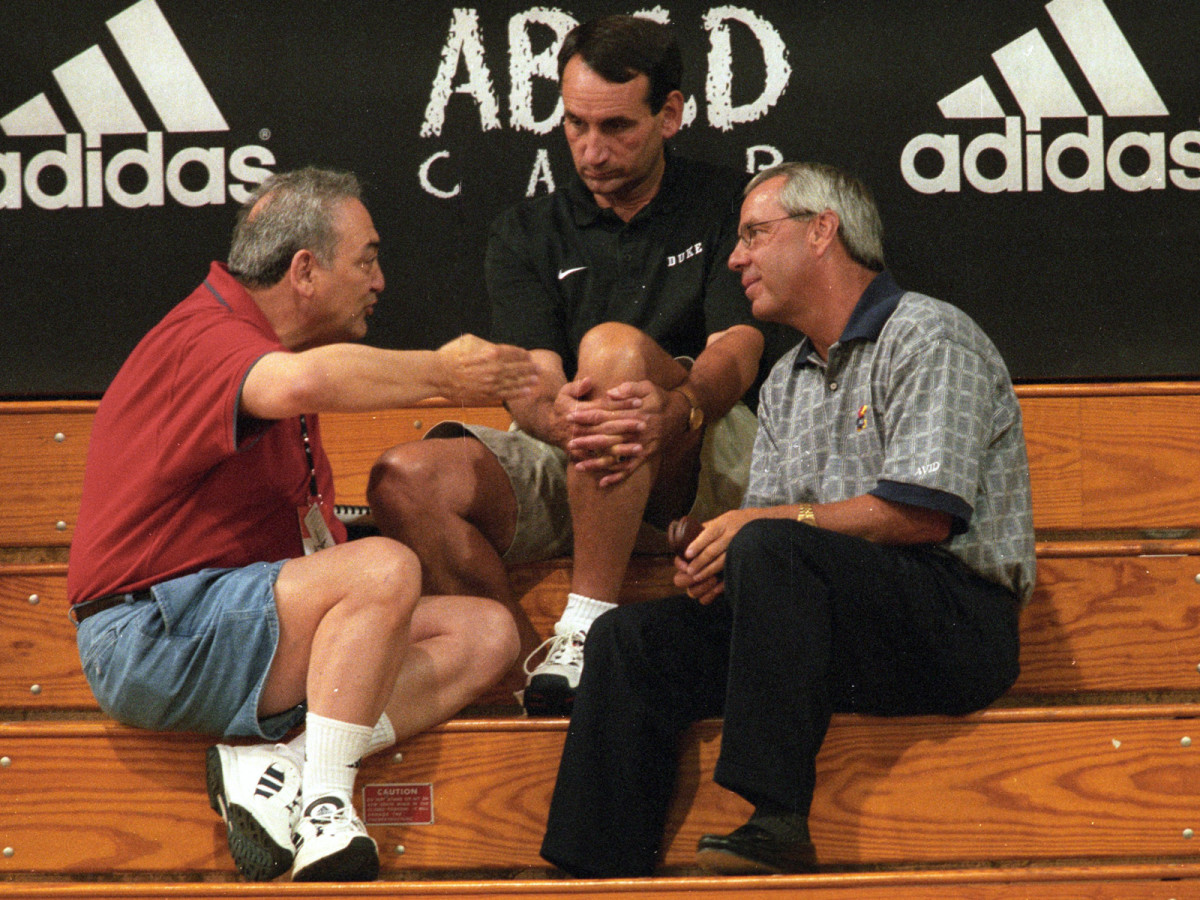'This Is Where the Floodgates Break': Sonny Vaccaro Says Scandal Blame Starts at the Top

The past week has been a busy one for Sonny Vaccaro. Last Tuesday he was home preparing to visit a family member in his home state of California when, around 6 a.m. he began being bombarded with emails and phone calls about a bit of breaking news that made so many immediately think of him: the arrests of four college basketball assistant coaches and three shoe company executives on bribery and fraud charges. For some five decades Vaccaro has been in touch with reporters, but never has he had a week like the one that followed that news. Just about every day someone has been reaching out to him for his thoughts. He has received calls from people to whom he’s never spoken, and from overseas outlets he’d never imagined would care. He has been reading their coverage too, and has one qualm: Not enough attention has been paid to the root causes of the alleged illicit payments that many feel threaten to bring down, or at least massively disrupt, the sport.
“I don’t think enough of you guys have hit on that,” Vaccaro said by phone this weekend from his home. “They caused it, the universities and shoe companies. They were the start of the whole problem.”
To many, this might seem rich. Vaccaro, after all, made his name as the individual most responsible for the relationships between footwear makers and colleges in the first place. He was a charismatic schoolteacher turned high school all-star game organizer in the 1970s before his vast network of college hoops connections helped land him a gig with Nike, at that time a running-shoe company trying to gain a foothold in basketball. Vaccaro pioneered the idea of paying college coaches—then typically on relatively modest five-figure salaries—and providing them free sneakers in exchange for their team’s players wearing the sneakers during games, transforming college athletes’ feet into de facto advertisements. Within a year Vaccaro had signed up a number of coaching heavyweights (John Thompson, Jerry Tarkanian, Jim Valvano, Lefty Driesell), for whom a team expense was eliminated from their budget while a new personal revenue stream was created. Over the following decades, as March Madness became a TV phenomenon and the basketball sneaker industry (thanks in large part to Vaccaro helping sign a young Michael Jordan to a Nike deal) morphed into a behemoth, the money being thrown around made the perks of merely providing free shoes feel quaint.
The 10 Most Pressing Questions About the College Basketball Recruiting Scandal
All the while, of course, the money being handed to the athletes themselves remained constant: none. Outside of their scholarships and related school funding, athletes were barred from getting a slice of the sport’s ballooning financial pie. But because their coaches, schools and the requisite administrators did, the value of the athletes’ services to them grew exponentially higher. Universities and their affiliated sneaker companies alike had a mutual interest of acquiring the best athletes possible, which would in turn help the schools earn money through winning (via postseason payouts, ticket and merchandise sales, school spirit–derived alumni donations, and so on) and provide the shoemakers with higher-profile, more credible endorsers.
But if the NCAA’s amateurism rules forbid them from openly bidding on athletes’ services, it only forced such bidding under the table. Too many people had too much at stake for the market forces to remain at bay. This encouraged arrangements such as the ones outlined in last week’s federal criminal complaints, where shoe companies and coaches conspire to pay athletes to secure their commitments to their schools, ultimately resulting in allegedly criminal conduct to bypass NCAA regulations. “By their rules,” Vaccaro said of the NCAA, “laws were broken.”
In recent years Vaccaro, who later worked for Adidas and Reebok, has left the sneaker industry to become an NCAA agitator-reformer. He has grown increasingly offended by the athletes’ inability to cash in on their abilities the way their coaches and athletic administrators can, and has come to be a refreshingly frank truth-teller in an industry where the supposed virtues of amateurism are often deployed as a sort of trump card. On an industry panel in 2001, he was asked by a former Penn State president why colleges should “be an advertising medium for your industry.” To which Vaccaro famously responded: “They shouldn’t, sir. You sold your souls, and you’re going to continue selling them... There’s not one of you in this room that’s going to turn down any of our money. You’re going to take it. I can only offer it.” He may have never been more right.
• School contracts with Nike, Adidas and Under Armour | Who's who of the FBI NCAA case

And so although the particulars of last Tuesday’s arrests may have hurt Vaccaro—while at Adidas he had hired Jim Gatto, the director for global basketball marketing who is among those charged—he says that he had “prayed for... something big enough to take to the American public to show the fallacy of what the NCAA has been perpetrating for years.” Perhaps the closest such previous case was the O’Bannon v. NCAA lawsuit that Vaccaro helped concoct in 2009, in which former UCLA star Ed O’Bannon served as lead plaintiff in an antitrust case over the organization’s royalty-free use of former players’ likenesses. A federal judge granted the plaintiffs a partial victory in 2014, ruling that the NCAA violated antitrust law and that schools should be allowed to compensate athletes for the full cost of attendance, but stopping short of ordering an open labor market.
Here Vaccaro hopes last week’s revelations may facilitate the public backlash needed for a more drastic overhaul. Things are too far gone for money and corporate interests to be fully divorced from collegiate sports—“Who pays for the commercials on CBS?” Vaccaro asks—but the realities of the business being laid bare could shift blame from supposedly rogue coaches and what some see as greedy kids to the system itself.
“I don’t know how you defend this,” Vaccaro says. “The financial arrangements between the universities and the shoe companies is the bottom line in this thing. How they can find 17-year-old kids guilty of some goddamn thing is beyond me. The coercion starts at the top. If the school wouldn’t have wanted the player, if the shoe companies wouldn’t have wanted the player, if they all didn’t want the player...”
The NCAA’s Rules Gave Rise to a Generation of Pimps. Here's How It Can Clean Them Up
The difference between this and other previous scandals is not only scope but authority. With the government and its subpoena power involved, meaning punishments include jail time rather than suspensions and forfeited victories, many expect those under investigation to implicate more coaches and schools than they would have been compelled to otherwise. Vaccaro likens it to Henry Hill in Goodfellas. “The two entities that are gonna continue forever are the shoe companies and the universities,” he says. “They’re immune to prosecution. They’ll keep selling shoes and they’ll keep having football and basketball teams at the universities. The lesser guys, what do they do the rest of their lives? Some of these guys have families. In my opinion, this isn’t being a snitch. This is being realistic. There are gonna be deals made and people will tell how it really happened.”
All of which Vaccaro and many others hope will help the public see what has long been really happening in college sports and what can be done to combat it. “If nothing else comes out of a bad, bad situation, maybe the public will actually pay attention to who and what the NCAA is actually running,” he says. “They’re running a well-oiled machine that pays well—to them.” Although maybe that can change too. “My prayer would be to get enforcement out of the NCAA’s hands and come to their senses and allow these kids to earn money while they’re playing sports,” he says. “I think that’s going to happen. Because it’ll happen again. Some kid’s gonna take something tomorrow. That’s what human nature is."
“This is where the floodgates break,” Vaccaro adds. “In my opinion, after watching this for 50 years, this is the first time I’ve witnessed that someone’s gonna be forced to tell the truth. Something should happen out of this—for a very, very negative reason, to a positive ending. I just think it’ll be exposed.”
